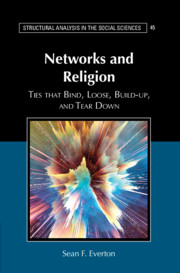
-
Select format
-
- Publisher:
- Cambridge University Press
- Publication date:
- 23 June 2018
- 12 July 2018
- ISBN:
- 9781108241748
- 9781108416702
- 9781108404075
- Dimensions:
- (228 x 152 mm)
- Weight & Pages:
- 0.68kg, 410 Pages
- Dimensions:
- (228 x 152 mm)
- Weight & Pages:
- 0.59kg, 412 Pages
- Subjects:
- Social Theory, Research Methods in Sociology and Criminology, Research Methods In Sociology and Criminology, Sociology of Religion, Sociology
- Series:
- Structural Analysis in the Social Sciences (45)
You may already have access via personal or institutional login- Subjects:
- Social Theory, Research Methods in Sociology and Criminology, Research Methods In Sociology and Criminology, Sociology of Religion, Sociology
- Series:
- Structural Analysis in the Social Sciences (45)
Book description
Social scientists who study religion generally believe that social networks play a central role in religious life. However, most studies draw on measures that are relatively poor proxies for capturing the effects of social networks. This book illustrates how researchers can draw on formal social network analysis methods to explore the interplay of networks and religion. The book's introductory chapters provide overviews of the social scientific study of religion and social network analysis. The remaining chapters explore a variety of topics current in the social scientific study of religion, as well as introducing a variety of social network theories and methods, such as balance theory, ego-network analysis, exponential random graph models, and stochastic actor-oriented models. By embedding social network analysis within a social scientific study of religion framework, Networks and Religion offers an array of approaches for studying the role that social networks play in religious belief and practice.
Reviews
'Although most social scientists who study religion agree that social networks play a central role in religious life, few studies draw on measures that adequately capture the effects of social networks. This book illustrates how researchers can draw on formal [Social Network Analysis] methods to explore the interplay of networks and religion.'
Source: American Sociological Association Section on Religion Newsletter
Contents
Metrics
Altmetric attention score
Full text views
Full text views help Loading metrics...
Loading metrics...
* Views captured on Cambridge Core between #date#. This data will be updated every 24 hours.
Usage data cannot currently be displayed.
Accessibility standard: Unknown
Why this information is here
This section outlines the accessibility features of this content - including support for screen readers, full keyboard navigation and high-contrast display options. This may not be relevant for you.
Accessibility Information
Accessibility compliance for the PDF of this book is currently unknown and may be updated in the future.


